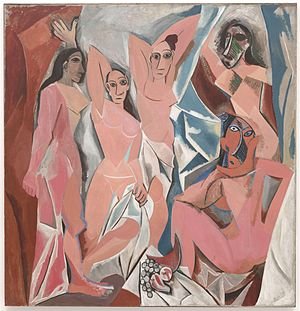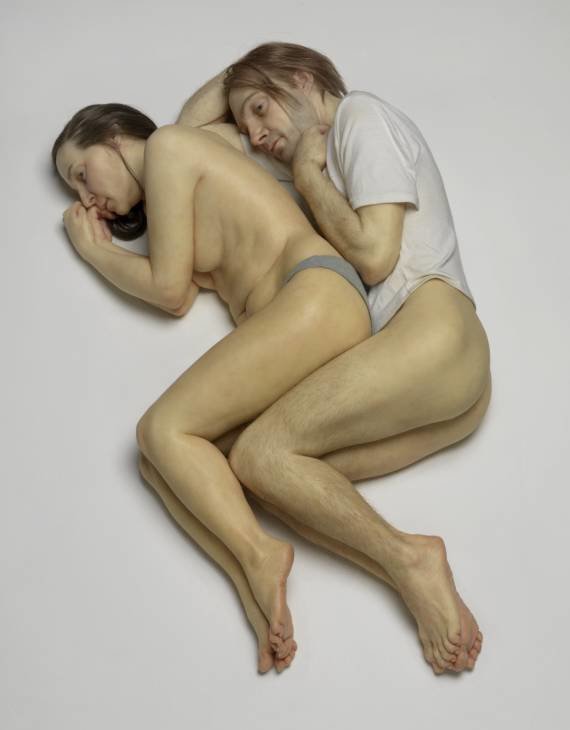
Les Demoiselles d’Avignon – Picasso – 1907
Abstract art, especially the work of Pablo Picasso, is always subject to individual interpretation yet always contains an underlying theme that expresses the “message” that the artist is attempting to convey to the viewer. It is due to this that before meticulously analyzing a particular painting it is important to first understand the inherent themes that that artist has placed into his previous work in order to gain a better perspective on what message he is trying to convey in the painting that is being examined.
What must be understood when examining the work of Picasso is the fact that his work is more symbolic rather than representative. It represents a combination of views created in an abstract way which cannot be possibly rendered in a classical artistic representation due to the diversity of subjects involved (Carbon et al., 191).
In this particular case it can be seen that the artist has chosen to utilize both curved, straight and angular lines in this piece in order to depict the characters involved. What must be understood is that the use of these particular line forms are intentional in that Picasso attempted to exaggerate aspects of the feminine body utilizing these particular line styles.
This can be seen in his use of sharp angular lines in this depiction of breasts while smooth and curving lines to depict the thighs, ass and arm all of which are commonly associated with a woman’s most appealing traits. what is unusual though in this case is his use of geometric shapes in the piece namely triangles which are evident in almost every single part of the painting if one were to take into account the requirements of a triangle namely an angled object with three sides.
Mass in this particular case is implied through the use of lines while the concept of space here seems to be rather minimal, almost inhibited in that the artist apparently tried to portray the subjects in this piece as being contained within a single room.
In fact in its portrayal of space the subjects in the painting are portrayed as being within a two dimensional space with little application of overall depth to the piece. The perspective in this particular case does not seem to be one where a viewer merely looks at the painting but apparently there seems to a certain type of “reverse” in this case wherein it is the painting that is look at the viewer.
This is apparent by the perspective of the subjects within it that apparently stare straight out at the viewer. What must also be taken into consideration when examining the painting itself is that the characters are apparently frozen in position gazing out at viewers but there is a certain degree of “motion” within the piece itself wherein the various subjects seemingly flow into each other. It must be noted though that the use of light is not quite used as much within the painting itself and is in fact strangely absent.
There is a certain illusion of the presence of light through the changes in tone from the bottom towards the top but it is very slight and not really an important aspect of the painting itself. On the basis of its design principle the painting has discontinuities on multiple levels with an apparent elision of limbs in one instance, abbreviation in another and sudden cleaving of the flesh and an apparent stylistic shift in the end.
In fact it was apparently the goal of the artist to create little perceived balanced in the painting and instead focused on emphasizing the sexuality of the subjects through the exaggeration of their feminine qualities. What must be understood is that this particular piece of art doesn’t follow what one would normally call “standard” aspects of design due to its abstract nature.
This is seen through the use of repeated triangle elements within the piece, the odd variation of colors ranging from flesh to white to brown in the subjects and the fact that scales and proportion seem slightly off. Based on this it can be seen that the goal of the artist for this particular piece was to initially shock viewers and then have them experience the effects of the reverse gaze.
What must be understood is that the painting itself is based off the concept of looking at whores within a prostitute den but due to the effect of the reverse gaze a reversal is done wherein it is not the viewer that is looking at the whores in question but rather the whores that are looking at the viewer.

Spooning Couple – Ron Mueck – 2005
Examining the Spooning Couple
In this examination what is observed is the hyper-realistic sculpture “the Spooning Couple” by Ron Mueck. As it can be seen from the picture shown above, the sculpture shows a couple in the act of “spooning” which is classified as a mild form of sexual interaction, however, when observing the sculpture there are multiple aspects that seem out of place. For instance, the expressions on the subjects within the sculpture are not of a couple sleeping, they are wide awake as evidenced by their open eyes.
Not only that, the love and affection that is normally associated with spooning is strangely absent from their face and what is present is merely an expression of deep thought rather than passion and lust. Further observations of the sculpture reveal strange discrepancies such as the woman wearing panties while the bottom half of the man is unclothed while the opposite is also true wherein the top half of the woman is unclothed yet the top half of the man is clothed.
This I believe is not a mere choice of aesthetics on the part of the artist but an essential aspect of the message that the sculpture was meant to impart. From a certain perspective, it can be assumed that the lack the of expression on the face of the subjects of the sculpture is related to their strangely clothed and unclothed state.
Since spooning is usually done after a certain degree of sexual interaction, the clothing on the bottom half of the woman and the top half of the man is indicative of a barrier between the two when it comes to sexual relations. Combined with the lack of sufficient contact (i.e. the man is not placing his hand around the woman) this is indicative of a lack of passion between the two.
It should also be noted that the pensiveness in the expression of both subjects within the sculpture may in fact be a way of them contemplating their current situation (Amy, 132). When taking such factors into consideration it can be stated that the “Spooning Couple” is actually a way in which Mueck has chosen to represent a period in a couple’s life wherein the passion has gone out of their relationship and they are merely stuck with each other.
The pensive expressions on their faces could actually be them thinking “how did we get this way”, “what did we do wrong”, “what should I do”, and “will it always be like this”? In short, Mueck has captured the essence of the evaporation of passion and has brought it out for the entire world to see.
Since such aspects are normally kept private between two people, this is a way in which Mueck has enabled the world to see just what it is like. From a certain perspective “the Spooning Couple” is a piece of art that resonates with many individuals today since a large percentage of present day couples have experienced moments where the passion in their married lives has simply evaporated.
Strategies Utilized by Artists
When looking at the work by Picasso and by Mueck, it can be immediately seen that both artists utilize completely different mediums in getting their message across. In the case of Picasso he utilized the reverse gaze of people being stared at by prostitutes in order to make them feel what it was like to be stared at.
Mueck on the hand utilized a realistic sculpture in order to invoke a certain degree of familiarity among people in relationships who have felt that their passion has fizzled out. Overall, both works were successful in their individual strategies in utilizing sexual elements in order to convey a much deeper truth.
Works Cited
Amy, Michaël. “Ron Mueck At The Brooklyn Museum.” Art In America 95.4 (2007): 132. MasterFILE Premier. Web.
Carbon, Clark et al. “When a Picasso is a “Picasso”: The entry point in the identification of visual art.” Acta Psychologica 133.2 (2010): 191-202. Academic Search Premier. EBSCO. Web.